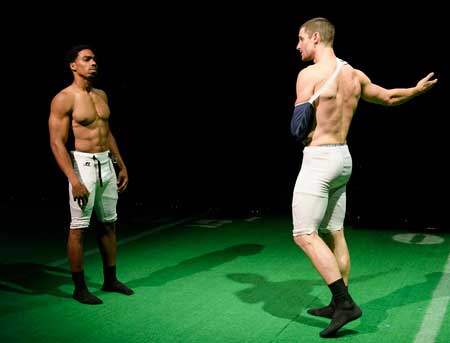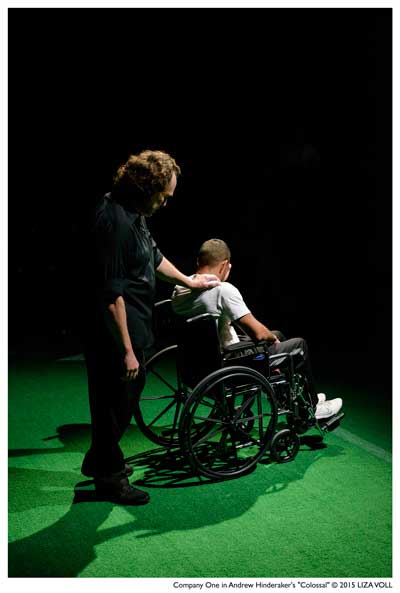Play
by Andrew Hinderaker
Directed by Summer L. Williams
Company One Theatre
Boston Center for the Arts, South End, Boston
July 17 – August 15, 2015
With Anthony Goss (Marcus), Greg Marino (Jerry), Alex Molina (Young Mike), Marlon Shepard (Mike), Doman Singeltary (Coach), Tommy Neblett (Damon)
Ensemble: Cameron Allen, Aaron Dowdy, Chris Pittman, Ben Salus, Henoch Spinola, Kai Tshikosi
Percussionists: Matthew Grina, Nick Liddie, Seth Pumilia

Alex Molina as Young Mike
in “Colossal”
Photo:Liza Voll
Courtesy of Company One Theatre
Mike (Marlon Shepard) is wheelchair-bound, injured in a football accident some time ago. Encountering his younger self (Alex Molina) in memory, he replays the scenes of his injury, of his relationship with Marcus (Anthony Goss), his fellow co-captain of the squad, and of his relationship with his father, Damon (Tommy Neblett), a professional dancer who had wanted Mike to pursue dance rather than football.
The setup of this short play about football is ingenious, with four quarters, each timed with a scoreboard at the head of the set, and a great half-time show consisting of three superb percussionists.
The premise of the play is that Mike has resisted his father’s encouragements to go into dance, focuses on football, but develops an intimate relationship with his fellow football co-captain, Marcus. Now an older Mike, wheelchair-bound, replays that history – the moments when he dove mid-game and injured himself, and the moments when he found satisfaction, and disappointment, in his encounters with Marcus.
The portrayals by the principals – Marlon Shepard, Alex Molina, Anthony Goss and Tommy Neblett – are intense and evocative, and the portrayal of the unexpected and complicated sexual encounter between Mike and Marcus is provocative and interesting. The staging by Summer L. Williams, with her muscled crew of footballers, is engaging and, espceially in its invocation of the older Mike’s video replaying of old football scenes, ingenious and witty.
The half-time show is totally entertaining and involves some great drumming by Matthew Grina, Nick Liddie and Seth Pumilia.

Marlon Shepard as Mike
in “Colossal”
Photo:Liza Voll
Courtesy of Company One Theatre
There is, however, so much non-verbal staging of football plays, of dance scenes, and of the half-time routine, that time that might have been spent filling out the narrative gets used up otherwise. We don’t get much about the development of the relationship between Mike and Marcus, nor do we get a very good sense about why Mike chooses football over dance. Though the relationship between Mike and his father, Damon, is portrayed in a touching way, we don’t learn much about that either.
In the end, one comes away with a sense of a suggestive drama, but one that does not quite investigate the themes that it puts forth.
The show is entertainingly staged, and the idea of doing it as a football game is fun and curious, but it’s not enough on its own to draw out the requirements of the narrative.
Suggestions of the complexities associated with race – Marcus is black, Mike is white – are put forth implicitly, but, though provocative, that theme, along with the sexual one, does not get articulated enough through the text to have as much impact as it might. Raising, but not exploring more thoroughly, these issues, the play kicks off and gains ground, but ultimately does not score as heavily as it might have.
– BADMan
Leave a Reply